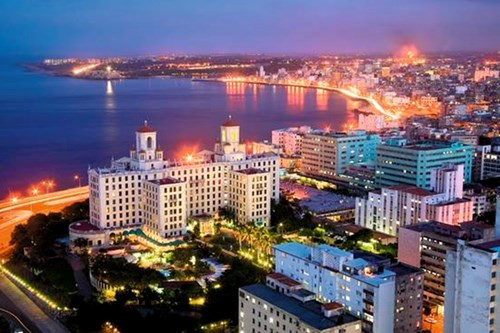Why does Cuba have a more promising future than the United States?
If the Trump administration does not throw a wrench in the transition, Cuba could emerge as a model of a democratic welfare state.
That is the opinion of scholar Mark LeVine - professor of Middle Eastern history at the University of California and visiting professor at Lund University - in an article for Al Jazeera.
 |
| The capital city of Havana is one of Cuba's magnets for American tourists. Photo: First Choice |
Despite being trapped by a half-century of US embargo, Cubans are clearly opening up to the outside world, according to professor Mark LeVine.
More important than pride in the past and present is the Cuban people's strong desire for the future. This desire can be seen not only in the rapid development of the Internet, despite its still quite expensive subscription prices (about 2-4 USD per hour but with seemingly no restrictions on searching), but also in the entrepreneurial spirit to generate additional income from tourism.
Cubans are eager to use the skills they have learned through Latin America's best education system to build the local economy rather than go abroad to make money.
Despite the new travel restrictions imposed by the Trump administration, Havana and other major tourist towns in Cuba are still welcoming American tourists, who are happy to set foot on this “island of honey and intoxication.” Cuba remains open to the outside world.
Cubans are proud of their country's level of human resource development, its low levels of inequality and its low crime rate compared to other countries in the region. Cuba has achieved these great achievements despite more than half a century of US embargo.
Without the United States “putting a spoke in the wheel,” Cuba’s natural, economic, and human resource potential could make the island a model for development for other countries in the region. With 11 million people, relatively abundant natural resources, a highly educated population, and opportunities for development in most economic sectors, Cuba has the potential to make a breakthrough on the road to a democratic welfare state. Cuba would preserve revolutionary-era ideas about social development while promoting Cuba’s entrepreneurial ethos and deep ties to the global economy.
But Cuba has many enemies. If the Trump administration and the conservative leadership of the Cuban exile community succeed in intervening in the transition after President Raul Castro leaves office, Cuba could be plunged into economic chaos and ethnic conflict. Cuba risks becoming once again a hub for drug trafficking, human trafficking, money laundering, cheap labor, and other forms of neoliberalism that have weakened Cuba’s Central American and Caribbean neighbors. This is the biggest problem facing Cuba.
America under President Donald Trump will certainly fall into a "black hole" of plutocracy and ethnic and class conflicts on an unprecedented scale.
Cuba has been in this situation before, and few people want to return to that dark past. "Make Cuba great again" is very close to the heart of most people on the island, in contrast to President Trump's slogan "Make America great again" that is causing the US to fall into isolationism and deadlock.
Scholar Mark LeVine concludes: Cubans have the ability to build a better future for themselves, while it is difficult to imagine Americans doing the same under President Donald Trump.
According to Kienthuc.net.vn
| RELATED NEWS |
|---|

